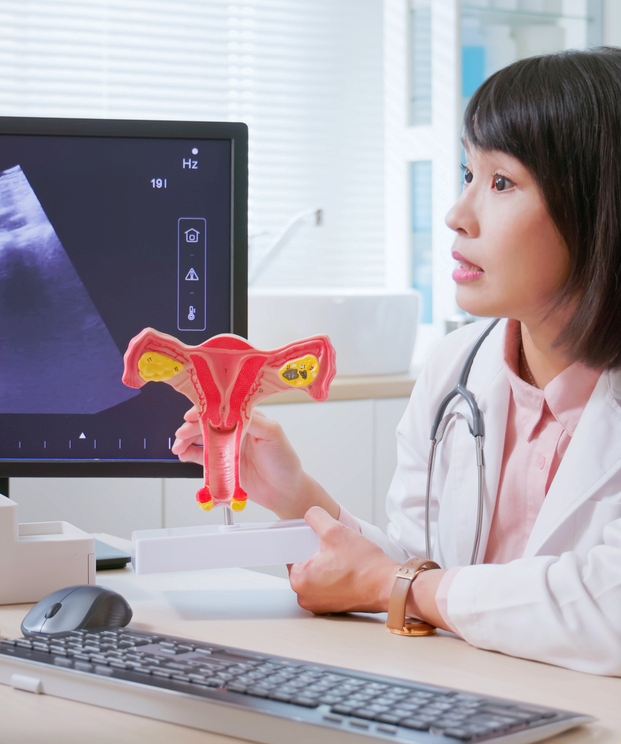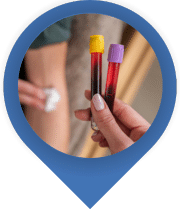The Latest Healthcare News
Check out our blog to learn more from our team about the latest medical advancements, health tips, and primary care news.

From reproductive years through menopause, there are many conditions that affect women’s hormones. One of them is Polycystic Ovary Syndrome, also known as PCOS. At AllCare, we understand how disheartening the symptoms of PCOS can be—especially if you are trying to conceive. From medications to hormonal treatments, our dedicated health professionals are well-versed in PSOC, and they help guide you through your testing and PCOS support with compassion, prioritizing your well-being every step of the journey.

Polycystic Ovary Syndrome (PCOS) is a common hormonal disorder affecting people with ovaries, typically during their reproductive years. PCOS occurs when the ovaries produce higher-than-normal levels of androgens (male hormones), which can disrupt the development and release of eggs during ovulation. This condition often leads to irregular menstrual cycles, difficulty conceiving, and a variety of physical symptoms, such as excess hair growth, acne, and weight gain. Additionally, small fluid-filled sacs (cysts) may form in the ovaries.
The exact cause of PCOS is not fully understood, but several factors are believed to contribute to its development:
Together, these factors create a cycle of hormonal imbalances that can affect ovulation, metabolism, and overall health.

We can prescribe medications to help regulate menstrual cycles, reduce acne, lower the risk of endometrial cancer, help with excess hair growth or loss.

Blood tests measure hormone levels and check for high cholesterol, triglycerides, and blood glucose levels since women with PCOS are more likely to have these conditions.

A thyroid function panel may be performed to rule out thyroid dysfunction as the cause of menstrual irregularities.

A physical exam, including a pelvic exam, can detect enlarged ovaries and other common signs of PCOS, including excess hair growth, acne, and insulin resistance.

An ultrasound will show the size of the ovaries, if there are any cysts present, and the thickness of the uterine lining.
Also called: Polycystic ovary syndrome, polycystic ovarian syndrome
PCOS symptoms can vary widely and may change over time. Some people experience only mild symptoms, while others face more noticeable challenges with menstrual health, skin, hair, and fertility. Many symptoms begin in the late teens or early 20s. Common symptoms of PCOS include:
PCOS may also increase the risk for type 2 diabetes, high blood pressure, high cholesterol, and endometrial cancer.
Medically reviewed by AllCare Primary & Immediate Care

Experience the convenience of telehealth appointments at AllCare. Our telemedicine services are designed to provide you with seamless access to healthcare without the need to leave your home. Whether you need an online doctor’s appointment for immediate or primary care, AllCare’s got you covered. With our online telehealth services currently available to individuals located in Virginia, Maryland, and Washington, D.C., you can connect with our experienced immediate and primary care physicians via secure video calls.
At AllCare, we are expanding our virtual healthcare access to all services previously offered in person. This includes:
Women who have PCOS often experience a range of emotions—from anxiety and depression to feeling relieved when properly diagnosed. Be sure to discuss your symptoms with an AllCare physician to make sure that none of them are putting you at risk for other conditions, including type 2 diabetes, high blood pressure, heart disease, or sleep apnea, to name a few. AllCare offers convenient appointments that fit your schedule with experts who understand the unique needs of women.
No, Polycystic Ovary Syndrome (PCOS) is not classified as an autoimmune disease. PCOS is primarily a hormonal disorder that affects the ovaries and reproductive system. While it shares some symptoms with autoimmune conditions, such as chronic inflammation and insulin resistance, it does not involve the immune system attacking the body’s own tissues, which is the hallmark of autoimmune diseases. However, research suggests that people with PCOS may have an increased risk of developing certain autoimmune conditions, such as Hashimoto’s thyroiditis, but PCOS itself is not considered autoimmune in nature.
There is no single test that can diagnose PCOS. In fact, a diagnosis is often made by your medical history, including:
Yes, Polycystic Ovary Syndrome (PCOS) can lead to weight gain due to hormonal imbalances, particularly elevated insulin levels, which can increase appetite and promote fat storage, especially around the abdomen.
Individuals with PCOS may also experience changes in metabolism and fatigue, making it harder to maintain a healthy weight. Managing weight is crucial, as even a small weight loss can improve symptoms, regulate menstrual cycles, and enhance fertility.
No. Currently, there is no cure for PCOS. While PCOS cannot be completely cured, many individuals can alleviate symptoms and improve their quality of life with consistent management. Medications may help regulate menstrual cycles, reduce excessive hair growth, and address insulin resistance.
Incorporating healthy dietary choices, regular physical activity, and stress management can also significantly impact symptom control and overall well-being. Regular check-ups with healthcare providers are essential for monitoring the condition and adjusting treatment plans as needed. With proper management, individuals with PCOS can lead healthy lives and minimize long-term health risks.
Getting pregnant with PCOS can be challenging, but many people with PCOS successfully conceive with the right approach. Here are some common strategies to help manage fertility and improve the chances of pregnancy:
If you’re struggling with PCOS, schedule an appointment at AllCare to explore effective PCOS treatment for pregnancy tailored to your needs.
At AllCare, we’re proud to deliver exceptional primary and immediate care to residents across Virginia, Maryland, and Washington D.C. From bustling city centers to serene suburban neighborhoods, our clinics are strategically placed for your convenience and care. Experience top-tier PSOC Treatment in your community with AllCare, where your health is our priority.
Check out our blog to learn more from our team about the latest medical advancements, health tips, and primary care news.
Seasonal Affective Disorder (SAD) represents a significant mental health concern affecting approximately 5% of adults in the United States. This […]
Read More >Mammograms save lives. Early detection of breast cancer through proper screening will give a patient a remarkable 99% five-year survival […]
Read More >Most people are aware that diet, exercise, and genetics affect cholesterol levels. But can stress raise your cholesterol? The answer […]
Read More >Our related healthcare services extend beyond immediate care to include preventive care such as routine physical exams, chronic disease management for conditions like diabetes, and specialty care referrals for more complex health issues.